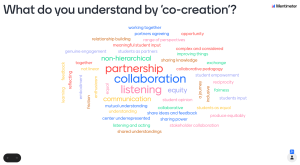Dr Carli Rowell, Lecturer in Sociology, University of Sussex | Twitter: @carliriarowell | Email: c.r.rowell@sussex.ac.uk
With student connectors from the university of Sussex: Mystique Charles, Jerome Morais, Hannah Cox and Claire McGuinness

This post guide readers through a workshop that I delivered on staff-student co-creation. In doing so, this post will:
- Provide readers with a introduction into staff/student co-creation, pedagogical groundings and motivations.
- Provide a co-creation case study.
- Provide guidance and encourage readers to think how co-creation might work in their context of their own roles.
- Offers a guide for those wishing to consider how co-creation can be embedded into your own teaching, offering six dimension for co-creation.
This workshop was delivered as part of the University College London Change Agents Network (CAN) Conference 2022, which produced a range of activities, tools and techniques to support the design of curriculum co-design and collaboration by taking the module “Class, Culture and Conflict: A view from within” (designed by Dr Carli Rowell) as a case study. The workshop, which was originally delivered in person has been adapted for an asynchronous audience below.
Abstract
The workshops aims are twofold. Firstly, it reflects on the experience of curriculum co-creation through Sussex Student Connector Project Program. Outlining the authors experience of designing a class inequalities module in co-creation with working-class, first-generation sociology students as a working-class academic and in doing so explores the key learnings, sharing best practice and ideas for innovation in relation to staff-student co-creation for curriculum design. Secondly, through the interactive element, the workshop will guide and encourage delegates to think how co-creation might work in their context of their own teaching / roles through the following (as examples):
- What constitutes staff-student co-creation?
- How do the possibilities of staff-student co-creation translate to delegates own academic disciplines / professional roles? What possibilities are afforded? How can we think through some of the challenges?
- How might we draw upon co-creation in formative and summative assessments?
- How might delegates draw upon co-creation their teaching (be it a whole module, one lecture, one seminar).
- What ethical issues may arise when seeking to engage in staff-student co-creation?
Workshop Presentation
The introductory presentation guides delegates through co-creation in theory, the important of bringing issues of social class into the classroom within sociology as well as the project’s origins, pedagogical foundations, the importance of viewing students as co-creators of knowledge and potential benefits to the student body. It also introduced delegates to the module “Class, Culture and Conflict: A view from within” (designed by Dr Carli Rowell) which is used as a case study for the workshop.
As part of the presentation delegates were also invited to share their one-word reflection in response to the question “What do you understand by co-creation?”. The responses are shown below:

Interactive Element
After this introduction delegates broke off into groups and completed a series of activities aimed at guiding them through co-creation within the context of their roles and disciplines. These activities have been adapted for an asynchronous audience below.
Staff Student Curriculum co-creation: A guide
Overview
The ‘dimensions of co-creation’ is a tool to aid thinking in relation to staff student curriculum co-creation. It has been designed to enable you to think through co-creation in practice in relation to your own discipline and role. It can be used by individuals and module teams to think about the possibilities of co-creation within the context of their practice (curriculum design, teaching and assessment). The seven (working) dimensions that I have identified have been designed to be used in the order that they appear, and this document can be used by both academics and learning technologists.
Identifying the ‘why’
- What do you understand by staff-student ‘co-creation’?
- Why is staff-student co-creation important to you?
- How do the possibilities of staff-student co-creation translate to your own a) academic disciplines and b) role (as an academic of teaching / learning support)? And c) to students?
Co-creation in the curriculum
- How do you see co-creation occurring in relation to curriculum design? (e.g. the section of topics, readings, course materials, the construction of the module assessment).
- How might co-creation be drawn upon throughout one’s teaching (in lectures, seminar’s and independent student study).
- How might you draw upon co-creation in formative and summative assignments?
Centering the students
- What do you want the students to get out of the curriculum co-creation?
- How can you ensure that students are rewarded for their labour in helping co-create the curriculum?
- What do you want the benefit(s) to the wider student body to be?
Challenges
- What are the possibilities of staff student curriculum co-creation (in relation to your module); what would make these possibilities come to fruition?
- What potential challenges can you identify in relation to staff student curriculum co-creation (in relation to your module).
- How can we think through some of the challenges? What support might we require?
Thinking through ethics
- What ethical issues may arise when seeking to engage in staff-student co-creation in relation to curriculum design, teaching and assessment?
- How might these ethical issues be mitigated? How might these ethical issues be managed in the moment should they arise?
Seeking support
- What support do you require? (Pedagogical, technological, from professional service staff, librarians, learning technologists etc).
- Where can you access this support?
Sustaining co-creation
- How might you be able to sustain co-creation?
- What challenges arise (given that students are so transient)? How can we overcome these challenges?